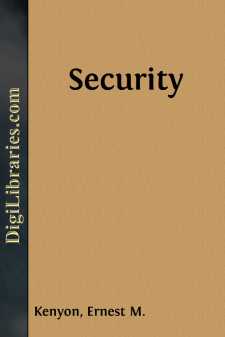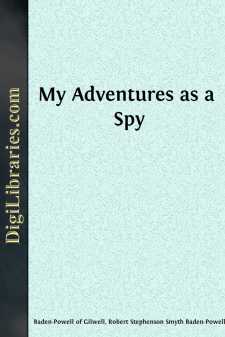Categories
- Antiques & Collectibles 13
- Architecture 36
- Art 48
- Bibles 22
- Biography & Autobiography 813
- Body, Mind & Spirit 142
- Business & Economics 28
- Children's Books 15
- Children's Fiction 12
- Computers 4
- Cooking 94
- Crafts & Hobbies 4
- Drama 346
- Education 46
- Family & Relationships 57
- Fiction 11829
- Games 19
- Gardening 17
- Health & Fitness 34
- History 1377
- House & Home 1
- Humor 147
- Juvenile Fiction 1873
- Juvenile Nonfiction 202
- Language Arts & Disciplines 88
- Law 16
- Literary Collections 686
- Literary Criticism 179
- Mathematics 13
- Medical 41
- Music 40
- Nature 179
- Non-Classifiable 1768
- Performing Arts 7
- Periodicals 1453
- Philosophy 64
- Photography 2
- Poetry 896
- Political Science 203
- Psychology 42
- Reference 154
- Religion 513
- Science 126
- Self-Help 84
- Social Science 81
- Sports & Recreation 34
- Study Aids 3
- Technology & Engineering 59
- Transportation 23
- Travel 463
- True Crime 29
Security
by: Ernest M. Kenyon
Categories:
Description:
Excerpt
Suddenly Collins snapped the pencil between his fingers and hurled the pieces across the lab, where they clattered, rolled from the bench to the floor, and were still. For a moment he sat leaning against the desk, his hands trembling. He wasn't sure just when the last straw had been added, but he was sure that he had had enough. The restrictions, red tape, security measures of these government laboratories seemed to close in on his mind in boiling, chaotic waves of frustration. What was the good of his work, all this great installation, all the gleaming expensive equipment in the lab around him? He was alone. None of them seemed to share his problem, the unctuous, always correct Gordon, the easy-mannered, unbearable Mason, all of them gave him a feeling of actual physical sickness.
Gardner's “Nucleonics and Nuclear Problems” lay open on the desk before him, but he looked instead beyond through the clear curving glass windows toward the sweep of green hills and darkening sky and the shadows of the lower forests that gave Fair Oaks its name. Beside him unfinished lay the summaries of the day's experiments, and the unorganized, hurriedly jotted notes for tomorrow's work. The old intellectual alertness was gone. Delight in changing theory, in careful experimentation no longer sprang from his work and were a part of it. There was a dull, indefinable aching in his head and a dry, dissatisfied sensation in his mouth.
Along the ordered walks below his laboratory windows workers and technicians streamed toward the gates, checking out for the day through the usual mass of red tape, passes, and Geiger tests. Lights were flicking on in the long East Wing Dormitory across the quadrangle, and the mess hall, where he had recently eaten a tasteless supper, was lighted.
Shortly after restrictions had really begun to tighten up last fall, he had written to a worker who had published making a minor correction in his calculations and adding some suggestions arising from his own research. A week later his letter was returned completely censored, stamped “Security-Violation.” It was that evasive Gordon's fault. He knew it, but he couldn't prove it. Collins suspected that the man was not a top-notch researcher and so was in administration. Perhaps Gordon was jealous of his own work.
Even the Journals were drying up. Endless innocuous papers recalculating the values of harmless constants and other such nonsense were all that was being published. They were hardly worth reading. Others were feeling the throttling effects of security measures, and isolated, lone researchers were slowing down, listless and anemic from the loss of the life blood of science, the free interchange of information.
The present research job he was doing was coming slowly, but what difference did it make? It would never be published. Probably it would be filed with a Department of Defense code number as Research Report DDNE-42 dash-dash-dash. And there it would remain, top-secret, guarded, unread, useless. Somewhere in the desk drawers was the directive worded in the stiff military manner describing the procedures for clearing papers for publication. When he had first come here, he had tried that.
“Well, good, Collins,” Gordon, the Division Administrator, had said, “glad to check it over. Always happy when one of our men has something for publication. Gives the Division a good name. I'll let you know, but we have to be careful. Security you know.”
Somehow he had never heard. The first time he had made a pest of himself with Gordon who was polite, evasive, always plausible. Gordon, Gordon—it was becoming an obsession with him he knew, but the man appeared at every turn. He personified the system.
In the past months his work had seemed to clog up in details and slow down....




